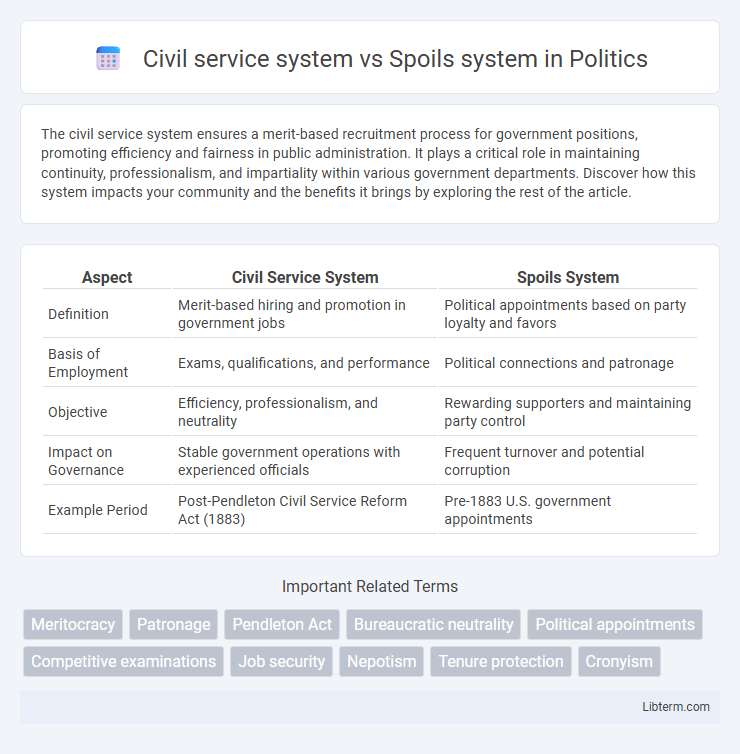The civil service system ensures a merit-based recruitment process for government positions, promoting efficiency and fairness in public administration. It plays a critical role in maintaining continuity, professionalism, and impartiality within various government departments. Discover how this system impacts your community and the benefits it brings by exploring the rest of the article.
Table of Comparison
| Aspect | Civil Service System | Spoils System |
|---|---|---|
| Definition | Merit-based hiring and promotion in government jobs | Political appointments based on party loyalty and favors |
| Basis of Employment | Exams, qualifications, and performance | Political connections and patronage |
| Objective | Efficiency, professionalism, and neutrality | Rewarding supporters and maintaining party control |
| Impact on Governance | Stable government operations with experienced officials | Frequent turnover and potential corruption |
| Example Period | Post-Pendleton Civil Service Reform Act (1883) | Pre-1883 U.S. government appointments |
Overview of the Civil Service System
The Civil Service System is a merit-based framework designed to recruit, promote, and retain government employees through competitive exams and qualifications, ensuring competence and impartiality in public administration. It contrasts sharply with the Spoils System, which awards jobs based on political loyalty rather than merit, often resulting in inefficiency and corruption. Established by the Pendleton Civil Service Reform Act of 1883, the Civil Service System aims to create a professional and stable workforce insulated from partisan pressures.
Understanding the Spoils System
The Spoils System, also known as patronage, involves awarding government jobs and favors to political supporters and loyalists as a reward for their assistance in winning elections. This practice often leads to unqualified individuals holding public offices, resulting in inefficiency and corruption within the civil service. In contrast, the Civil Service System emphasizes merit-based hiring and promotion, relying on competitive exams and qualifications to ensure competent and professional government employees.
Historical Evolution of Both Systems
The civil service system evolved from the 1883 Pendleton Civil Service Reform Act, which established merit-based hiring and aimed to eliminate corruption by requiring competitive exams for government jobs. In contrast, the spoils system, dominant during the early 19th century under Andrew Jackson, was characterized by awarding government positions to political supporters regardless of qualifications. The shift from spoils to civil service marked a crucial transformation in U.S. government administration, improving efficiency and reducing patronage-driven appointments.
Core Principles and Objectives
The Civil Service System prioritizes merit-based hiring, professional competence, and impartiality to ensure efficient and fair government operations. It aims to prevent political patronage by establishing standardized exams and performance evaluations for public employees. In contrast, the Spoils System centers on rewarding political supporters with government jobs, emphasizing loyalty and partisan advantage over qualifications and long-term governance stability.
Recruitment and Selection Process
The civil service system emphasizes merit-based recruitment and selection through standardized examinations and objective criteria to ensure qualified candidates enter public service. In contrast, the spoils system relies heavily on political patronage, where appointments are made based on party loyalty and connections rather than competence. This distinction affects the efficiency and professionalism of government operations, with the civil service system promoting transparency and fairness in hiring practices.
Merit-based vs. Patronage-based Employment
The civil service system emphasizes merit-based employment, relying on qualifications, competitive exams, and performance to ensure competent government personnel. In contrast, the spoils system operates on patronage-based employment, where government jobs are awarded to political supporters and allies regardless of ability. Merit-based hiring fosters professionalism and reduces corruption, while patronage-based appointments often lead to inefficiency and favoritism in public administration.
Impact on Government Efficiency
The Civil Service System improves government efficiency by promoting merit-based hiring and reducing political patronage, leading to a more professional and competent workforce. In contrast, the Spoils System often results in frequent turnover and appointments based on loyalty rather than skill, decreasing administrative stability and effectiveness. By minimizing nepotism and favoritism, the Civil Service System enhances policy implementation and public trust in government operations.
Corruption and Accountability Issues
The Civil Service System minimizes corruption by implementing merit-based hiring and promotion, reducing political favoritism and increasing accountability through standardized evaluations and oversight mechanisms. In contrast, the Spoils System fosters corruption by awarding government jobs as political rewards, encouraging patronage, nepotism, and lack of responsibility among appointees. This undermines public trust and often results in inefficiency and abuse of power due to weak accountability frameworks.
Reforms and Modernization Efforts
Reforms in the civil service system emphasized merit-based hiring through competitive exams and protections against political patronage, replacing the spoils system's practice of awarding government jobs based on political loyalty. Modernization efforts included the establishment of the Pendleton Civil Service Reform Act of 1883, which created an independent Civil Service Commission to enforce merit principles and reduce corruption. These changes led to increased efficiency, professionalism, and fairness in public administration by promoting qualified candidates and limiting political influence in government employment.
Global Perspectives and Case Studies
The civil service system, exemplified by countries like the United Kingdom and India, emphasizes merit-based recruitment and promotion through competitive examinations and performance evaluations, promoting efficiency and reducing corruption. In contrast, the spoils system, historically prominent in the United States during the 19th century, relies on patronage and political appointments, often leading to nepotism and lack of professionalism. Global case studies reveal that transitioning from spoils to civil service reforms enhances governance transparency, as seen in reforms in South Korea and Brazil, which have improved public sector accountability and service delivery.
Civil service system Infographic

 libterm.com
libterm.com